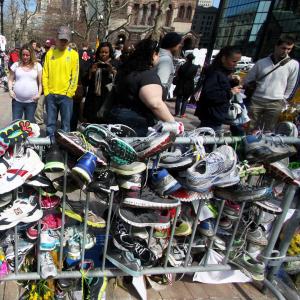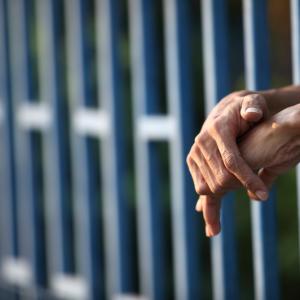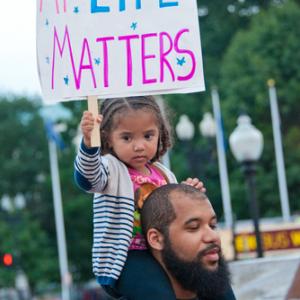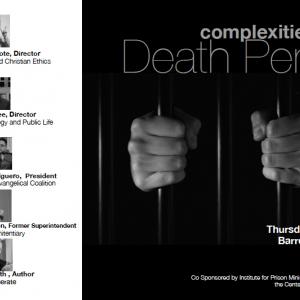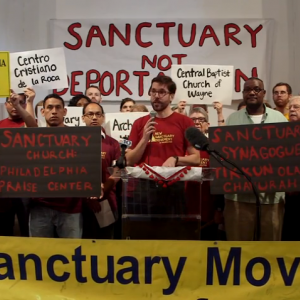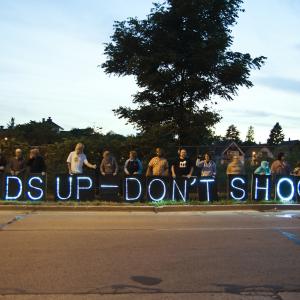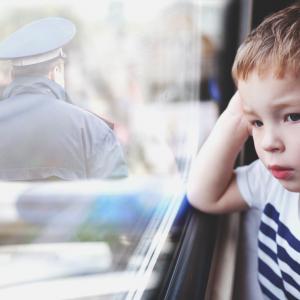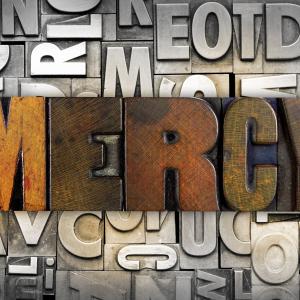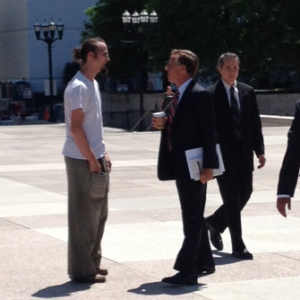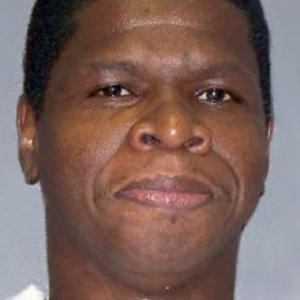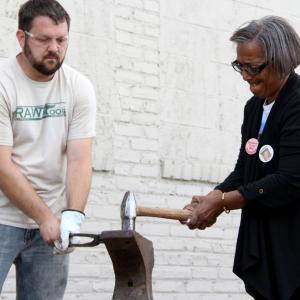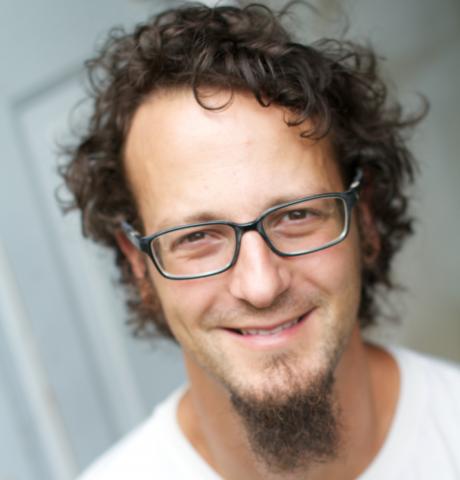
Shane Claiborne is a Red Letter Christian and a founding partner of The Simple Way community, a radical faith community that lives among and serves the homeless in the Kensington neighborhood of Philadelphia. He is the co-author, with Chris Haw, of Jesus for President. His newest book is Executing Grace: Why It is Time to Put the Death Penalty to Death.
Posts By This Author
What Do I Do With My Confederate Flag?

Image via Christophe BOISSON/shutterstock.com
I own a Confederate flag. Growing up, the flag meant little more to me than school spirit, pep rallies, and Southern pride … until I left East Tennessee. I’ll never forget the moment things began to change. I moved into my college dorm room and established my new home at Eastern University in Philadelphia. I carefully set up my desk, put my posters on the wall, and displayed my high school yearbook — with a Confederate flag on the cover — proudly on my bookshelf.
Death Has Lost Its Sting: Conflicted Response to Tsarnaev's Death Sentence
His guilt is clear. He posted offensive, arrogant messages all over the Internet. He carved a manifesto of revenge into the boat where he hid as police captured him. He flipped a bird at the camera in his jail cell.
The evil he is responsible for is horrific. More than 250 people injured. Seventeen people lost their limbs. Four people died — one of them 8 years old.
It’s no surprise that a jury found him guilty, and still no surprise that they sentenced him to death.
What’s remarkable is the lack of enthusiasm that accompanied Tsarnaev’s death sentence. One person after another had mercy on their lips – from victims of the Boston bombing to the legendary Sr. Helen Prejean who met with Dzhokhar and spoke of his heartfelt remorse.
Holy Week in an Unholy World

Photo via R. Gino Santa Maria / Shutterstock.com
We call it Holy Week. But it was a terrible week.
His trial reeked of injustice. His own disciple sold him out for a few pieces of silver, betrayed him with a kiss … and hung himself.
As he was arrested, one of his closest friends disregarded all his teaching on love, pulled out a knife, and cut a guy’s ear off. (Jesus called him out … and healed the other guy). A lot of the stuff that happened that first holy week was pretty unholy.
Once arrested, he was passed back and forth between politicians and bureaucrats. There was Caiaphas the priest, the Sanhedrin council, Pontius Pilate, the crowd — everyone seemed to want him dead, but no one wanted blood on their hands. Even Pilate washed his clean.
They had all kinds of accusations. Insurrection. Inciting a riot. Conspiracy. Terrorism (plotting to destroy the temple). Blasphemy.
But all he did was love. And heal. And give people hope.
Despite any substantial evidence, witnesses, or signs of any crime committed, he was pronounced guilty and sentenced to die.
As he awaited his fate, he was bullied, interrogated, harassed, tortured, beaten to a pulp. The authorities humiliated him and stripped him naked. They mocked the claims of his divinity, ramming a crown of thorns onto his head and wrapping him in a royal purple robe as they laughed.
And so it went. This man who many believe was the holy one that the prophets spoke of, the long-awaited Messiah, God incarnate, love with skin on— was executed, brutally. He died with his body convulsing as his lungs collapsed, with vultures swarming overhead, hoping to clean up after the execution. There is nothing more evil than what happened that “Good” Friday.
The Gospel of Kelly Gissendaner
Georgia clergy just delivered 500 signatures of faith leaders and 40 boxes of names from around the world — calling for a stop to tonight’s execution of Kelly Gissendaner. And there are more than 55,000 folks on the Groundswell petition that launched just yesterday, and more than 1,000 new names are coming in every hour.
But some suggest it is like speaking into thin air — that there is no chance the governor or the Georgia Board of Pardons and Parole will listen. After all, Georgia has already executed two people this year, more than any state other than Texas.
But there’s a Georgia case that would suggest otherwise, that all this may not be in vain — that of Billy Moore.
After 17 years on death row for a murder he openly confessed to doing, Billy Moore’s execution was stopped — by a groundswell of support from faith leaders (including Mother Teresa), people of conscience, and even the victim’s family. And it was the Georgia Board of Pardons and Parole that stopped his imminent execution. In fact, they eventually decided his rehabilitation was so complete and compelling that he was eligible for parole a year later.
So thousands of Georgia citizens and folks around the world are hopeful. Tonight there is an opportunity — not to be “soft on crime” or to ignore wrongdoing, but to bear witness that redemption is possible. Tonight Georgia leaders have a chance to recognize that people can be healed, rehabilitated, restored — and that they do not have to be forever held hostage and defined by the worst decision they made.
Interrupting Death: Women and Capital Punishment
Only 15 women have been executed in the U.S. since the reinstatement of the death penalty in 1976. For two death penalty cases involving women to make the news in the same week is unprecedented – but it’s happening.
One is Jodi Arias, convicted of killing her ex-boyfriend in 2008, whose sentencing trial was this week. She could face the death penalty in Arizona.
The other is a lesser-known case in Georgia — Kelly Gissendaner, convicted in a 1997 Atlanta murder plot that targeted her husband. Though sentenced to death, it is clear that with a little better legal coaching, Ms. Gissendaner could have plea-bargained for her life. That’s exactly what her husband’s killer, Gregory Owens, did. And now he’s behind bars as she counts down the hours to her death. It just doesn’t feel like your life should depend on how well you play the legal cards, but it sure seems to.
Kelly Gissendaner was supposed to die Wednesday night — but there was an interruption.
Executions Are Down and Abolition May Not Be Far Behind
It looks like the death penalty may be on life support.
January was set to be the deadliest month for U.S. executions in 2015, but nine of the 15 executions were stopped. In an unprecedented wave, three of the deadliest states stopped executions planned for last month — Texas, Oklahoma, and Missouri. February has just begun, but nine of its 12 scheduled executions have been halted.
Last year was not a good year for the death penalty, either, as death sentences hit a 40-year low and executions were at a 20-year low.
There were botched executions such as that of Clayton Lockett, who writhed in pain for 43 minutes before dying of a heart attack, with the Oklahoma prison warden calling it “a bloody mess.”
Then there were the exonerations, such as that of Ricky Jackson in Ohio, who spent 39 years in prison for a crime he didn’t commit, convicted solely on the testimony of a 12-year-old boy who recanted.
Injustice Has Many Names
There is power in a name.
One of the things happening in our world right now is that people are “naming” injustice. No longer are we just talking about statistics, numbers and data. We are lifting up the names of the victims of a failed justice system. And there is something in a name that humanizes and personalizes the issue, and wakes us up: Trayvon Martin, Michael Brown, Eric Garner, Tamir Rice.
The numbers have names.
They remind us of the collateral damage of a failed system, and the urgency of this moment. We can’t make injustice history until we make injustice personal.
For many people of color, the victims of injustice have had names for a long time. Emmett Till helps us know how far we have come; Eric Garner reminds us how far we still have to go. But now these names are being talked about in homes and around dinner tables all over the world.
Every name of a life lost is an image of God. When we lost them, we lost a little piece of God’s image in the world. They are friends, sons, sisters, fathers and neighbors.
How to Build Authentic Community
I’ve often told young college shoppers: Don’t just consider how strong the academics are, or how good the football team is, or even how you like the campus or the town. All of those are good questions, but make sure you also ask: “What do you pay your housekeeping staff?”
One of the true tests of a good college is how they treat their workers, and certainly a decent indicator of that is how the lowest paid workers fare in contrast to the highest paid administrators. A good question of any college president is if he or she would be comfortable exchanging salaries for a year with the janitor. After all, both are just as valuable in the eyes of God.
So it was a great privilege this month to be invited to chapel at my alma mater, Eastern University, for “Housekeeper Appreciation Day.” Celebrating the unsung heroes of the campus is becoming a beloved tradition, and it is a wonderful one.
In the presence of the president, deans, administrators, and hundreds of students and faculty, dozens of campus workers were put into the spotlight and celebrated for their tireless work to keep the campus alive and beautiful. There was a genuine love thick in the room – hugs, tears, and I caught glimpse of a fist-pound or two. Then they were given a certificate of appreciation and a paid vacation day, because more than 200 students committed to pitch in so they could take off.
I had students tell me about how housekeeping staff tutor them in Spanish. And I had housekeeping staff tell me how students had been there for them during really hard times.
Wheaton College Tackles the Death Penalty with Jesus in Mind
On Nov. 6, Wheaton, “the Harvard of Christian colleges,” is hosting a forum on the death penalty. But it’s not just any forum. It has potential to reshape the way evangelicals in America think about the topic.
In addition to Wheaton’s own ethicist Vincent Bacote and Mercer University scholar David Gushee, the panelists include Kirk Bloodsworth, who spent eight years on death row for a crime he didn’t commit. Also on the panel is Frank Thompson, former superintendent of the Oregon State Penitentiary who witnessed executions. And finally, there is Gabriel Salguero, who heads up the National Latino Evangelical Coalition and is also a member of the National Association of Evangelicals, a Christian powerhouse representing 45,000 congregations from over 40 denominations.
This is big.
I’ll admit, part of me wished this monumental death penalty event was happening at my alma mater, Eastern University. After all, Eastern is well-known for its social justice edge, its progressive faculty — folks like Tony Campolo and Ron Sider. One Eastern alum, death penalty lawyer Bryan Stevenson, was recently called “America’s young Nelson Mandela” by Desmond Tutu and interviewed in Time magazine and The New York Times.
After I pouted a little while, I realized the significance of this forum.
Welcoming the Stranger (Even If It’s Against the Law)
BREAKING NEWS:
There is a nonviolent uprising around immigration happening in Philadelphia and a dozen other U.S. cities. Philadelphia faith leaders announced that they will welcome immigrant families even if it is against the law. They are building a movement of "sanctuary congregations" and have dreams that the U.S. will one day be a sanctuary nation.
We join them in insisting that we must obey the laws of God over the laws of our government — and that means "welcoming the foreigner as if they were our own flesh and blood." (Exodus 22:21, Lev.19:34, etc., etc.).
Jesus says that when we welcome the stranger we welcome him. When God asks: "When I was a stranger did you welcome me?" (Mt. 25) we are not going to say: "Sorry God, Congress wouldn't let us."
We know that sometimes divine obedience can mean civil disobedience.
As St. Augustine once said: "An unjust law is no law at all."
A Nonviolent Uprising
Dr. King said: a “riot is the language of the unheard.”
What happens when folks do not feel like their voices are being heard?
They shout louder.
Rioting is what almost happened in Ferguson, and all of us who live in fragile neighborhoods with a backdrop of deep racial injustice need to pay attention.
In Ferguson, a close-knit community was devastated by yet another injustice. They wanted to be heard. But as peaceful marches began, they were met with unprecedented force.
Tears were met with teargas.
It was as if authorities were putting their hands up over their ears. So the people shouted louder – and the world began to pay attention.
At a fragile moment when emotions were running high, the people of Ferguson had to choose between rioting and nonviolent direct action in the streets. A very small group (many of them arguably out-of-state activists) resorted to some forms of property damage. And it caught the media’s attention.
Some might say it hijacked the headlines.
But that is not how I will remember Ferguson.
Give Us New Eyes
It’s been said that our politics are often shaped by what we see out the window.
Twenty years ago, if you would've asked me if I thought police treat people fairly regardless of race, I would have confidently said, “Yes” — just like 70 percent of white folks in the recent Pew survey. In fact, 30 years ago, if you would've asked me what I wanted to be when I grew up I’d have said “a policeman.”
I grew up in a small town in Tennessee, which was still very segregated. Growing up, we knew the police officers by name. On more than one occasion, the police saved the day, and countless news stories celebrated the heroism and courage of police officers.
My mom and I used to go on walks together in a park, and I always looked forward to bumping into the officer who patrolled the park. She was tough as nails but always greeted me with an enthusiastic smile and a big bear hug. At the age of ten, she appointed me a “Junior Officer,” and she gave me a “real metal badge.” I felt like I was at the top of the world, and on my way to be officer of the year.
And then my window changed.
Marching Through Death’s Desert
It’s 93 degrees in Texas today. And Rev. Jeff Hood is walking 200 miles across the state. What would compel somebody to do that? He wants to end the death penalty … and he is not alone.
Rev. Jeff Hood is a Southern Baptist pastor, deeply troubled by his denomination’s stance on capital punishment. And he is troubled because he lives in the most lethal state in the U.S. Texas has had 515 executions since the reinstatement of the death penalty in 1976 – the next state in line is Oklahoma with 111. That means Texas is responsible for 37 percent of the executions in the U.S. Jeff has been a longtime organizer and board member for the Texas Coalition to Abolish the Death Penalty, a movement that is gaining some serious momentum these days.
A growing number of Texans — and Americans in general — are questioning the death penalty. A recent ABC poll shows we are over the tipping point, with more than half of Americans being against the death penalty and in favor of life in prison, putting death penalty support at a new low. For some it is the racial bias – in Texas it is not uncommon for an African American to be found guilty by an all-white jury. In fact, in considering “future dangerousness,” a criteria necessary for execution in Texas, state “experts” have argued that race is a contributing factor, essentially that someone is more likely to be violent because they are black – prompting articles like the headline story in the New York Times about Duane Buck: “Condemned to Die Because He is Black.”
If It Weren’t for Jesus, I Might be Pro-Death Penalty Too
Southern Baptist leader Albert Mohler wrote a piece last week defending the death penalty. In his 1,200-word argument for why Christians should support the death penalty, he does not mention Jesus a single time.
Digging deeper, as you read the official pro-death penalty statement of the Southern Baptists, there is not a single reference to Jesus or the Gospels.
There are plenty of other problems with the scriptural maneuvering used to justify the contemporary practice of the death penalty with a few verses from the Bible, in the same way that a few verses were misused to justify slavery. For starters the biblical death penalty was required not just for murderers, but also for folks that committed adultery, disrespected their parents, collected too much interest, had premarital sex, and disobeyed the Sabbath. But I want to stick with the nagging problem of Jesus, the greatest obstacle for pro-death penalty Christians.
In a recent Barna Poll, fewer than 5 percent of Americans think Jesus would support capital punishment, and fewer than a quarter of young Christians support it. Nonetheless some Christians find ways to sidestep Jesus, the lens through which all of us who claim to be Christians should interpret the Bible and the world around us.
Tennessee Death Row Inmates Invite Governor to Pray With Them
Last week, the men on Tennessee’s death row, four of whom have scheduled execution dates in the near future, invited Gov. Bill Haslam, the man who signs the death warrants, to join them for prayer
The backdrop for the story is that Tennessee has more executions scheduled in a year than the state has had in the past 50 years. Last week as Christians around the world remembered Good Friday, the day Jesus was executed, legislators in the Bible Belt state passed a bill to reinstate the electric chair (which would make it the only state to require death by electrocution). The only thing that could be more troubling would be if Tennessee decided to start crucifying people again. I even heard one politician defend his position saying, “It is God’s job to judge them, but our job to get them to Him.”
The First Year of the Pope’s Revolution
A year ago yesterday — March 13, 2013 — Pope Francis officially became pope. Since then he has fascinated the world.
He didn’t don the snazzy red shoes and fancy papal attire. He chose a humble apartment rather than the posh papal palace. He washed the feet of women in prison. He touched folks that others did not want to touch, like a man with a disfigured face, making headline news around the world. He has put the margins in the spotlight. He refused to condemn sexual minorities saying, “Who am I to judge?” He has let kids steal the show, allowing one little boy to wander up on stage and stand by him as he preached.
Stop Duane Buck's Execution
Twenty-seven evangelical Christian leaders across Texas and the United States are calling on Harris County District Attorney Devon Anderson to allow a new, fair sentencing hearing for Duane Buck. Mr. Buck is an African-American man who was condemned to death after his sentencing jury was told that he was likely to be a future danger because of his race. These evangelical Christian leaders oppose the setting of any execution date for Mr. Buck.
“We write to respectfully request that you support a new, fair sentencing hearing for death row prisoner Duane Buck,” the letter states. “Although opinions on the death penalty vary within each of our churches, we are strongly united in our view that no death sentence should be a product of racial discrimination, as it was in Mr. Buck’s case.”
Grief, Courage, and Perseverance
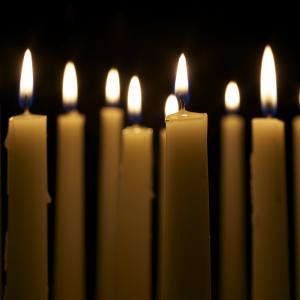
swatchandsoda / Shutterstock
[Editor's note: This article first appeared in our December 2013 issue to commemorate the one year anniversary of the Sandy Hook shooting.]
IN THE YEAR since the mass shooting at Sandy Hook Elementary School in Newtown, Conn., last Dec. 14, thousands more have died by gun violence, and the NRA seems to stymie sane firearm measures at every turn. How do we stave off despair, hold on to hope, and keep moving forward when the odds feel overwhelming? —The Editors
Bigger Than Politics
What do we say to those who are weary?
by Brian Doyle
WHAT WOULD I SAY to those who are weary of assault rifles mowing down children of all ages, every few months, for as long as we can remember now? Oregon Colorado Wisconsin Pennsylvania Connecticut Texas Massachusetts Minnesota Virginia do I need to go on? I would say that this is bigger than politics. I would say this is about money. I would say Isn’t it interesting that we are the biggest weapons exporter on the planet? I would say that we lie when we say children are the most important things in our society. I would say that the next time a tall oily smarmy confident beautifully suited beautifully coiffed glowing candidate for office says the words family values, someone tosses an assault rifle on the stage with a small note attached to it that reads Is this more important than a kindergarten kid?
We all are Dawn and Mary in our hearts and why we wait until hell and horror are in front of us to unleash our glorious wild defiant courage is a mystery to me.
I would also say, quietly, that this is bigger than rage and anger and snarling at idiots who pretend to hide behind the Constitution. I would say this is also about poor twisted lonely lost bent young men no one paid attention to, no one really cared about. And I would say that people like Dawn Hochsprung and Mary Scherlach, who ran right at the bent twisted kid with the rifle in Newtown, are the flash of hope and genius here. Those are the people I will celebrate on Dec. 14. There are a lot of people like Dawn Hochsprung and Mary Scherlach, may they rest in peace. We all are Dawn and Mary in our hearts and why we wait until hell and horror are in front of us to unleash our glorious wild defiant courage is a mystery to me. But it’s there. And there are a lot of days when I think the whole essence of Christianity, the actual real no kidding reason the skinny Jewish man sparked the most stunning possible revolution in history, is to gently insistently relentlessly edge us away from our savagely violent past into a future where Dawn and Mary are who we are, and you visit guns in museums, and war is a joke, and defiant peace is what we say to each other all blessed day long.
Brian Doyle is the editor of Portland Magazine at the University of Portland (Oregon) and the author most recently of The Thorny Grace of It, a collection of spiritual essays.
-----
An Insanity of Rationality
This spiritual disease thrives on violence and calls it good.
by Joan Chittister, OSB
THERE IS A MADNESS abroad in the land, hiding behind the Constitution, brazenly ignoring the suffering of many who, over the years, have died in its defense, and operating under the banner of rationality. It’s a rare form of spiritual disease that thrives on violence and calls it good.
They want a proper response to violence, they tell us, and, most interesting of all, they insist that only violence can control violence. If “the good guys” have guns, this argument goes, “the bad guys” won’t be able to do any harm.
The hope? The hope lies only in those who refuse to feed this addiction to violence.
This particular insanity of rationality argues that violence is an antidote to violence. Then why do we find scant proof of that anywhere? Why, for instance, hasn’t it worked in Syria, we might ask. And where was the good of it in Iraq, the land of our own misadventures, where the weapons of mass destruction we went to disarm did not even exist and the people who died in the crossfire of that insanity had not harbored bin Laden. So how much peace through violencehave all the good guys on all sides really achieved?
The insanity of rationality says it is only reasonable to arm a population to defend itself against itself. And so, day after day, the level of violence rises around us as hunting rifles and small pistols turn into larger and larger weapons of our private little wars.
Clearly this particular piece of childish logic has yet to quell the gang violence in Chicago. It didn’t even work on an army base in Texas where, we must assume, the place was loaded with legal weapons.
What’s more, it does nothing to save the lives of the good guy’s children, who pick up the good guy’s guns at the age of 2 and 3 and 4 years old and turn them on the good guy fathers who own them.
So the mayhem only increases while white men in business suits insist that their civil rights have been impugned, their right to defend themselves has been taken from them, and more guns, larger guns, insanely damaging guns are the answer. Instead of hiring more police officers, they argue that arming students and teachers themselves, nonprofessionals, will do more to maintain calm and control the damage in situations specifically designed to cause chaos than waiting for security personnel would do.
It is that kind of creeping irrationality that threatens us all.
And in the end, it is a sad commentary on our society. We have now become the most violent country in the world while our industries collapse, our educational system declines, women are denied healthcare, our infrastructure is falling apart, and there’s more money to be made selling drugs in this country than in teaching school. No wonder gun pushers fear for their lives and sell the drug that promises the security it cannot possibly give while the country is becoming more desperate for peace and security by the day.
The hope? The hope lies only in those who refuse to feed this addiction to violence. These are they who remember again that we follow the one who said “Peter, put away your sword” when it was his own life that was at stake.
The hope is you and me. Or not.
Joan Chittister, OSB, a Sojourners contributing editor, is executive director of Benetvision, author of 47 books, and co-chair of the Global Peace Initiative of Women.
Bringing America Back to Life
Yesterday, I read about the 2-year old child who shot herself by accident in North Carolina over the weekend. Then I read about the horror of another school shooting in Nevada. Only hours later — shots rang out again on our block in North Philadelphia, for the second time this week. This time a bullet went through the window of one of the houses owned by our non-profit.
I was talking to a friend about my anger over the 300 lives lost in our city this year to gun violence. With the most sincere intentions, my friend said in an attempt to console me: “It’s just the way the world is.”
I’m not willing to give up that easy. It may be the way the world is today, but it doesn’t have to be the way the world is tomorrow.
Remembering Francis: From 12th Century Rebel to 21st Century Pope
Today, Oct. 4, Christians around the world remember one of the great heroes of our faith, and the current pope’s namesake – Francis of Assisi. But Francesco Bernadone (Francis of Assisi), who died on Oct. 3, 1226, must be laughing at the irony of it all.
He was one of the first critics of capitalism, one of the earliest Christian environmentalists, a sassy reformer of the church, and one of the classic conscientious objectors to war. Even though it’s hard to imagine a saint whose life is more relevant to the world we live in today, Francis was not always so popular.
Legend has it, the first time he preached at the Vatican, the pope told him to go preach to the pigs. But later the pope had a vision: the corner of the church was collapsing, and little Francis and the youth of Assisi were holding it up. Arguably that youth movement was one of the most powerful restorations of church history. While he did not hold back on his relentless critique of the church, he remained humble and hopeful. He stopped complaining about the church as it was and started dreaming of the church as it could be. As Francis said, he heard God whisper: “Repair my Church, which is in ruins.”
So perhaps it’s providential that 800 years later the pope is named after him.
